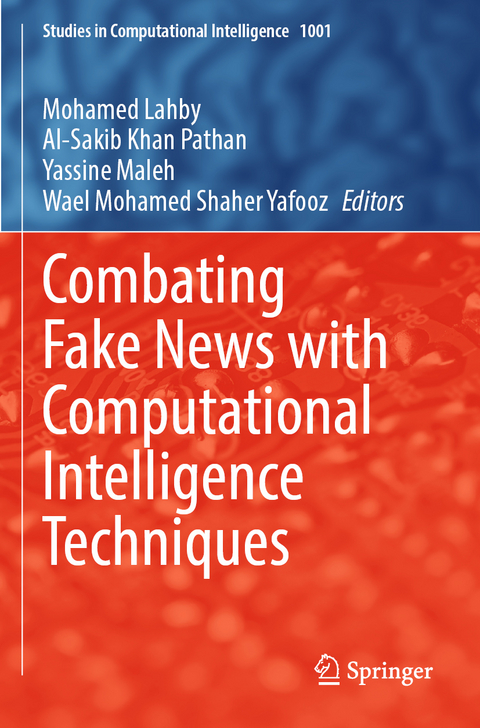
Combating Fake News with Computational Intelligence Techniques
Springer International Publishing (Verlag)
978-3-030-90089-2 (ISBN)
This book presents the latest cutting-edge research, theoretical methods, and novel applications in the field of computational intelligence techniques and methods for combating fake news. Fake news is everywhere. Despite the efforts of major social network players such as Facebook and Twitter to fight disinformation, miracle cures and conspiracy theories continue to rain down on the net. Artificial intelligence can be a bulwark against the diversity of fake news on the Internet and social networks.
This book discusses new models, practical solutions, and technological advances related to detecting and analyzing fake news based on computational intelligence models and techniques, to help decision-makers, managers, professionals, and researchers design new paradigms considering the unique opportunities associated with computational intelligence techniques. Further, the book helps readers understand computational intelligence techniques combating fake news in a systematic and straightforward way.
Part I: State-of-the-art.- Online Fake News Detection Using Machine Learning Techniques: A Systematic Mapping Study.- Using Artificial Intelligence against the Phenomenon of Fake News: a Systematic Literature Review.- Fake news detection in internet using deep learning: A review.- Part II: Machine Learning Techniques and Fake News.- Early Detection of Fake News from Social Media Networks using Computational Intelligence Approaches.- Fandet Semantic Model: An OWL Ontology for Context-Based Fake News Detection on Social Media.- Fake News Detection using Machine Learning and Natural Language Processing.- Fake News Detection using Ensemble Learning and Machine Learning Algorithms.- Evaluation of Machine Learning Methods for Fake News Detection.- Credibility and Reliability News Evaluation Based on Artificial Intelligent Service with Feature Segmentation Searching and Dynamic Clustering.- Deep Learning with Self-Attention Mechanism for Fake News Detection.- Modeling and solving the fake news detection scheduling problem.- Part III: Case Studies and Frameworks.- The multiplier effect on the dissemination of false speeches on social networks: Experiment during the silly season in Spain.- Detecting News Influence in a Country: One Step Forward Towards Understanding Fake News.- Factors Affecting the Intention of Using Fintech Services in the Context of Combating of Fake News.- Crowd Sourcing and Blockchain-based Incentive Mechanism to Combat Fake News.- Framework for Fake News Classification using Vectorization and Machine Learning.- Fact Checking: An Automatic end to end Fact Checking System.- Part IV: Fake news and Covid-19 pandemic.- False Information in a Post Covid-19 World.- Applying Fuzzy Logic and Neural Network in Sentiment Analysis for fake news detection: Case of Covid-19.- Analyzing Deep Learning Optimizers for COVID-19 Fake News Detection.- Detecting Fake News On COVID-19 Vaccine from YouTube Videos Using Advanced Machine Learning Approaches.
| Erscheinungsdatum | 19.12.2022 |
|---|---|
| Reihe/Serie | Studies in Computational Intelligence |
| Zusatzinfo | XIII, 435 p. 156 illus., 135 illus. in color. |
| Verlagsort | Cham |
| Sprache | englisch |
| Maße | 155 x 235 mm |
| Gewicht | 679 g |
| Themenwelt | Mathematik / Informatik ► Informatik ► Datenbanken |
| Informatik ► Theorie / Studium ► Künstliche Intelligenz / Robotik | |
| Sozialwissenschaften ► Kommunikation / Medien ► Medienwissenschaft | |
| Technik | |
| Schlagworte | Artificial Intelligence • Computational Intelligence • Data Science • Fake News • Machine Learning/ Deep Learning • Social Networks |
| ISBN-10 | 3-030-90089-4 / 3030900894 |
| ISBN-13 | 978-3-030-90089-2 / 9783030900892 |
| Zustand | Neuware |
| Haben Sie eine Frage zum Produkt? |
aus dem Bereich


